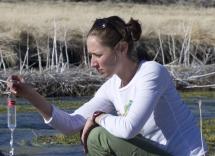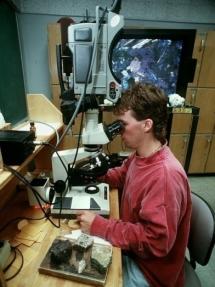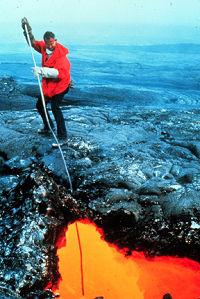
(modified from: https://www.agiweb.org/workforce/faqs/index.html)
View AGI's VIDEO "Careers for Geoscientists"
For more information, visit https://www.agiweb.org/workforce/faqs/index.html
What is a Geoscientist?
Geoscientists study the Earth's physical composition, structure, history, and the natural processes. They provide information to society for use in solving problems and establishing policies for resource management, environmental protection, public health, safety, and welfare. For example, geoscientists:
- Explore and discover new ideas about the natural world from the depths of the oceans and the core of the Earth to the outer reaches of space that help us better understand how the Earth and universe works.
- Finding adequate supplies of natural resources, such as ground water, petroleum, natural gas, and metals.
- Conserving soils and maintaining agricultural productivity.
- Developing natural resources in ways that safeguard the environment.
- Maintaining quality and quantity of water supplies.
- Reducing human suffering and property loss from natural hazards, such as volcanic eruptions, earthquakes, floods, landslides, hurricanes, and tsunamis.
- Determining geological controls on natural environments and habitats and predicting the impact of human activities on them.
- Defining the balance between society's demand for natural resources and the need to sustain healthy ecosystems.
- Understanding past global climate patterns to predict future climate change.
Most of all, geoscientists enjoy the Earth. It is an outdoor laboratory filled with opportunities to observe Earth processes in action. By applying knowledge of forces that shape the Earth, geoscientists seek to reconstruct the past and anticipate the future.
Importantly, the job market is strong. A recent study projected that there will be a shortage of 135,000 geoscientists for this in-demand field by the end of the decade. In addition, geology is one of the least likely fields to lead to underemployment.
Majors Most & Least Likely to Lead to Underemployment
–Washington Post
What is a day in the life of a geoscientist like?
Most geoscientists say that they enjoy the challenge and diversity of their work and that there is no "typical" day. Geoscientists work with people, data, information, ideas, and technology. Geoscientists often work with other scientists and engineers in teams, reflecting the complexity of the problems they address. Information technology and the Internet have greatly increased the accessibility of data and the speed of communication among people worldwide, and has likewise affected the pace and diversity of the geosciences.
Geoscience work often includes an interesting mix of indoor and outdoor duties which are seldom found in any other profession. Geoscientists divide their time among the joys of working in the outdoor environment, the laboratory and the office. Field work may entail the preparation of geologic maps and collecting samples that will later be analyzed in the laboratory. For example, rock samples may be x-rayed, studied under a polarizing or electron microscope and analyzed for chemical content. Geoscientists may also conduct experiments or design computer models to test theories in order to provide data that will mitigate the effects of earthquakes, volcanic eruptions and flooding.
In the office, they gather and interpret data, generate ideas, and communicate the results of their work in written reports and oral presentations that include maps and diagrams that illustrate the results of their investigations. Such maps can pinpoint areas favorable to the occurrence of ores, coal, oil, natural gas or underground water, or indicate subsurface conditions of construction sites.
What are some of the different subdisciplines of the geosciences?
The geosciences are composed of five major disciplines: geology, geophysics, atmospheric sciences, space sciences, and oceanography. There are numerous subdisciplines, reflecting diverse areas of specialization. Each of these fields allows for combining different disciplines - such as physics, chemistry, mathematics, and biology with geoscience. One of the main reasons students are drawn to geoscience is because they can easily merge their interests in most scientific fields with geology - an approach that is well-suited for solving environmental problems as the study of the Earth also involves understanding its physics, chemistry and biology!
Some occupations in geoscience are:
Atmospheric scientists study weather processes; the global dynamics of climate; solar radiation and its effects; and the role of atmospheric chemistry in ozone depletion, climate change, and pollution.

Environmental geochemists investigate natural and polluted water resources and soils.
Environmental geologists work to solve problems with pollution, waste disposal and urban development and hazards, such as flooding and erosion.
Geochemists investigate the nature and distribution of chemical elements in rocks and minerals.
Geomorphologists study the effects of Earth processes and investigate the nature, origin and development of present landforms and their relationship to underlying structures.

Geophysicists decipher the Earth's interior and its magnetic, electric, and gravitational fields.
Glaciologists study the physical properties and movement of glaciers and ice sheets.
Hydrogeologists study the occurrence, movement, abundance, distribution, and quality of subsurface waters and related geologic aspects of surface waters.
Hydrologists are concerned with water from the moment of precipitation until it evaporates into the atmosphere or is discharged into the ocean; for example, they study river systems to predict the impacts of flooding.
Mineralogists study the formation, composition and properties of minerals.
Oceanographers investigate the physical, chemical, biological, and geologic dynamics of oceans.

Petrologists determine the origin and genesis of rocks by analyzing mineral or grain relationships.
Paleontologists study fossils to understand past life forms and their changes through time and to reconstruct past environments.
Petroleum geologists are involved in the exploration and production of oil and natural gas.
Planetary Geologists study the origin and geology of other planetary bodies.
Sedimentologists study sedimentary rocks and the processes of sediment formation, transportation and deposition.
Seismologists study the location and force of earthquakes and trace the behavior of earthquake waves to interpret the structure of the Earth.

Soil scientists study soils and their properties to determine how to sustain agricultural productivity and to detect and remediate contaminated soils.
Stratigraphers investigate the time and space relationships of layered rocks and their fossil and mineral content.
Structural geologists analyze Earth's forces by studying deformation, fracturing, and folding of the Earth's crust.
Volcanologists investigate volcanoes and volcanic phenomena.
Where are Geoscientists employed?
Government
-
- United States Geological Survey
- State Geological Surveys
- Environmental protection agencies (e.g. CT DEEP)
- State Highway Departments
- City and County Governments
- The US Department of Defense
- NASA
Nature/Science Centers & Museums
Industry
-
- Environmental and Geotechnical Consulting firms
- Mining Industry
- Petroleum Industry
Education
-
- University Professors
- University Research
- K-12 and High School Teachers
What courses should I take in High School?
- Our Geological Science programs require a strong high school background in science and math. You should take Chemistry, Biology, Physics, and Math (ideally at least through precalculus)
- Good writing, communication, and critical thinking skills are also necessary.
How far do you need to go in school?
- a 4 year Bachelor's degree is sufficient for many entry-level industry positions.
- a 2 year Master's Graduate degree is preferred for advancement in industry and government.
- a Ph. D. (3+ years) is required for most college/university teaching and advanced research positions.



